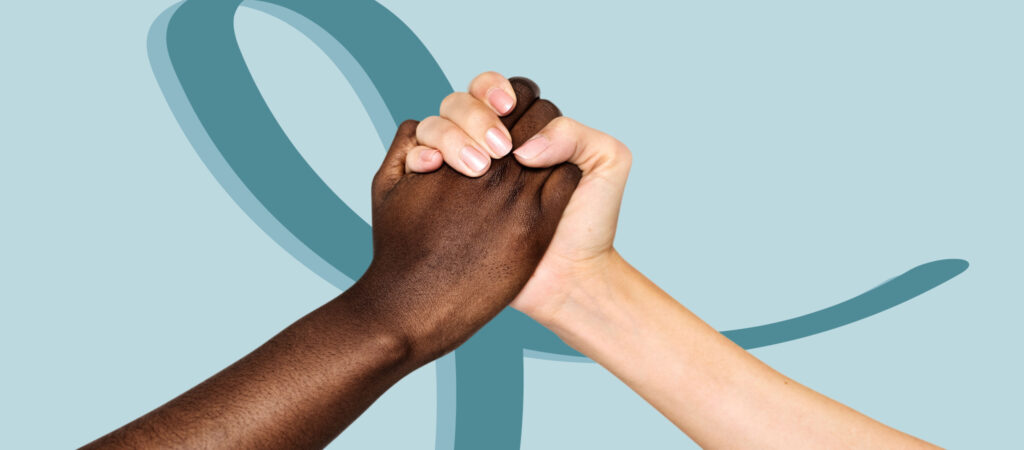You Should Know This About Sexual Assault
April is Sexual Assault Awareness Month — learn what an expert wants you to be aware of.
Although #MeToo put the topic of sexual assault at the center of the cultural conversation for a while, it’s still not talked about nearly as much as it occurs. Every 68 seconds, an American is sexually assaulted. Sexual assault is defined as any sexual act that occurs without the victim’s consent, and includes unwanted sexual touching, being forced to perform sexual acts, attempted rape, and rape.
Not only is sexual assault more common than you probably realize, it doesn’t look like what you see on tv crime dramas. Rape by a stranger makes up only a small percentage of sexual assaults. “Most often the victim knows the perpetrator—it’s an acquaintance or partner,” says Beth Kaplan, MD, senior medical advisor to Nurx and former medical director of the sexual assault program at San Francisco General Hospital.
And while women make up the majority of victims, 1 in 10 rape victims is male, and transgender and gender nonconforming individuals are at increased risk.
Sexual Assault Need-to-Knows
April is Sexual Assault Awareness Month, when organizations such as the Rape, Abuse & Incest National Network (RAINN), National Sexual Violence Resource Center, and FORGE (which is focused on transgender individuals), draw attention to the problem, advocate for victims and educate about the resources available to victims and their loved ones.
Because sexual assault is so incredibly common, it’s important to understand a bit about how to handle it if you or a friend or loved one is a victim. “The important things to know are that it’s never the victim’s fault, and that there are resources and support systems available to help you through it,” says Dr. Kaplan.
Physical Health After Sexual Assault
Although it is entirely your choice, know that there are many good reasons to go to the emergency room after an assault. “You’ll receive medical treatment for any wounds you may have, pregnancy and HIV prevention if those are concerns, and connection with support resources in your community,” says Dr. Kaplan. You’ll also have the option of evidence collection, when a medical professional collects DNA and other types of evidence in case you choose to prosecute the perpetrator. (Next week we’ll share more about this process when we interview a rape advocate who provides support to victims in the ER.)
If your sexual assault put you at risk of pregnancy or STIs, medical care can protect you and help you reclaim a sense of control over your body. Emergency contraception in pill form may work 3-5 days after sex, depending on the formula, but is more likely to be effective the sooner you take it. You can also get a copper IUD inserted up to five days after the assault and it will be more than 99% effective at preventing pregnancy.
Getting tested for sexually transmitted infections is an important part if taking care of yourself at this time. If HIV is a concern, know that you can take medication called PEP (post-exposure prophylaxis) that is highly effective at preventing HIV if taken within 72 hours, though it is more likely to be effective the sooner you take it.
Mental Health After Sexual Assault
Experiencing sexual assault is “one of the most traumatic things you can go through,” says Dr. Kaplan, and there is no set path or timeline for recovery. Victims of assault are at risk of serious mental health problems including PTSD, alcohol and drug misuse, and thoughts of self-harm or suicide. That doesn’t mean you can’t survive and thrive after sexual assault, but you need to take mental healthcare seriously.
One important part of that is reaching out to others. When it comes to the story of what happened to you, whether to tell, what to tell and who to tell is entirely your choice to make. “But it’s important to not isolate — reach out to others as early as you can,” says Dr. Kaplan. If you don’t want to talk to friends or family, or even if you do, you can reach out the the national sexual assault hotline and speak to experts confidentially about your experience and your options. The hotline can connect you with support including counseling and group therapy, whether virtually or in real life. “Break the silence—connectivity is more important than you might realize to healing.”
For Information and Support
If you or a loved one is a victim of sexual assault, reach out to the National Sexual Assault Hotline, at 800.656.HOPE (4673) or via the live chat on the RAINN website.
This blog provides information about telemedicine, health and related subjects. The blog content and any linked materials herein are not intended to be, and should not be construed as a substitute for, medical or healthcare advice, diagnosis or treatment. Any reader or person with a medical concern should consult with an appropriately-licensed physician or other healthcare provider. This blog is provided purely for informational purposes. The views expressed herein are not sponsored by and do not represent the opinions of Nurx™.







